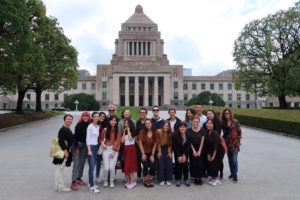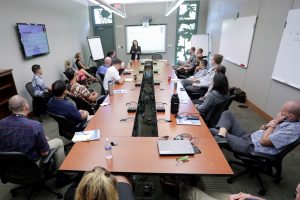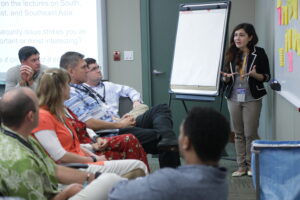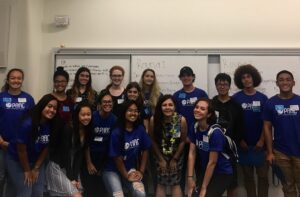Teaching






Teaching Interests
- International relations
- Comparative politics
- Political economy
- International security
- Asian regionalism
- Japanese politics and foreign policy
- Relationship between economics and security
- Government-business relations
- Research methods and fieldwork
Teaching and Mentorship Awards
- Presidential Citation for Meritorious Teaching, University of Hawaii at Manoa (2021)
- Faculty Mentoring Grant for Summer Undergraduate Research and Creative Works, University of Hawaii at Manoa (2020)
- Certificate of Award, Daniel K. Inouye Asia-Pacific Center for Security Studies (2017)
- Outstanding Graduate Student Instructor Award, University of California, Berkeley (2014)
Current Courses
University of Oxford
- Japanese Politics and International RelationsJapan is often seen as a puzzle by scholars. It has a vibrant and mature democracy, yet it has been dominated by a single political party for most of the last seven decades. It formally renounced war in its “peace constitution,” but its Self-Defense Forces are considered by many to be one of the most sophisticated militaries in the world. It surprised observers with its “economic miracle” after World War II, then it suddenly slumped into several decades of slow or no economic growth after the bursting of its asset bubble in the early 1990s. It is viewed as a powerhouse of cultural appeal and as a good international citizen by some, yet it continues to be embroiled in historical disputes over its imperial past. This graduate course examines the evolution of Japanese domestic politics and international relations focusing on the end of World War II to the present, situating the country in regional and global context and highlighting the ways that its experiences shed light on broader questions in social science. No prior knowledge of Japan, politics, or international relations is required.
Past Courses
University of Hawaii at Manoa
- Asian Studies 312: Contemporary AsiaThis undergraduate course engages with social science perspectives on Asia, focusing particularly on political, economic, and security dynamics. We begin with a brief historical discussion of the factors that shaped the Asian region prior to World War II, from the transition from a Sino-centric order to the rise of Japanese imperialism. The second section of the course covers varying models of economic development and political transition in key Asian countries from the Cold War to the present. The third section of the course moves to forces and actors in contemporary Asia, examining the role of power, interests, and ideas in shaping relations within and between actors such as Japan, China, South Korea, North Korea, ASEAN countries, India, Russia, and the US. The final section of the course explores the challenges and opportunities created by a host of transnational issues such as economic integration, military rivalry, territorial disputes, maritime security, outer space, cyberspace, energy, health, the environment, irregular migration, human rights, and soft power.
- Asian Studies 462: Contested Issues in Contemporary JapanThis course for undergraduate and graduate students explores some of the most controversial political, foreign policy, economic, and social issues in Japan today. Although we draw on broader historical themes, the course focuses primarily on the period from the 1990s to the present, examining important changes precipitated by the end of the Cold War and the bursting of the Japanese economic bubble. After a brief overview of Japanese history, we examine Japan’s changing politics, focusing on major political actors and using the 2011 Fukushima nuclear disaster as a lens through which to examine state-society relations. We then turn to Japan’s changing foreign policy, addressing basing issues, constitutional revision, and historical disputes. The final section of the course explores changing economics and society during Japan’s “lost decades” in terms of changing employment trends, demographics, gender, and immigration policy. We also problematize how these issues have been reported in the media. In addition to completing quizzes, online discussion posts, and other short assignments, students will write three short position papers addressing contemporary policy issues. This course fulfills the Writing Intensive focus requirement.
- Asian Studies 499: Directed Reading on Women in Contemporary JapanThis directed reading course for undergraduate and graduate students explores some of the critical political, economic, and social issues facing women in contemporary Japan, drawing on disciplines such as political science, economics, sociology, anthropology, and law. Registration is available only to students with prior approval from the instructor.
- Asian Studies 626: Capitalism in Contemporary AsiaThis graduate course provides an overview of the political economy of the Indo-Pacific region, integrating works from both comparative and international political economy. We begin with an examination of foundational literature on models of economic development, which were challenged by the emergence of the Japnaese “economic miracle” after World War II. We examine the development of Japan, the “Newly Industrialized Economies” (South Korea, Taiwan, Hong Kong, Singapore), Southeast Asia, China, and India before proceeding to a discussion of economic relations between these states and with the global political economy more broadly. Drawing on research from political science, economics, sociology, international relations, and Asian studies, we explore topics such as venture capital, business networks, trade, trade wars, finance, and foreign economic aid. In addition to writing short response papers and leading class discussion, students will also write a literature review paper and present their findings.
- Asian Studies 687: Conflict and Cooperation in AsiaThis graduate course explores themes of conflict and cooperation in Asia by examining cross-border political, economic, and security trends in the region and analyzing the ways that these issues bring countries together or push them apart. Why do economic ties between Asian countries continue to grow at the same time as the region is plagued by political and security tensions? How do non-traditional security issues simultaneously challenge individual states yet encourage them to work with one another to find common solutions? Drawing on research from political science, international relations, security studies, economics, sociology, and Asian studies, we explore topics such as economic integration, transnational business networks, military alliances, nuclear politics, nationalism, territorial disputes, economic-security linkages, transnational crime, irregular migration, health, environmental issues, outer space, cyberspace, soft power, and regional institutional architecture. The course covers a broad set of countries, providing some deeper historical grounding for these topics but predominantly focusing on developments since the end of the Cold War.
- Asian Studies 689: International Relations of AsiaThis graduate course provides an overview of international relations in Asia. How well do theories of international relations explain interstate relations in Asia? How do international security and economic issues interact with the domestic politics of specific countries? We begin by studying varieties of international relations theory to develop a framework for the course, including a discussion of the ways that conventional theories have been challenged by other perspectives. We then probe the analytical value of these theories through an examination of the realities of Asia and its key regional actors. Particular attention is paid to the United States, Japan, China, South Korea, North Korea, ASEAN, and India. We also briefly discuss Russia, Australia, and New Zealand. The course concludes with reflections on what international relations theories suggest about the future of the Asian region and on how the field of international relations itself may need to evolve. Students will write three response papers, lead discussion, write a literature review paper, and present their paper to the class.
- Asian Studies 695: Plan B Culminating ExperienceThe Plan B culminating experience is a rigorous process in which graduate students are asked to assemble a portfolio of the work that they have produced in previous seminars, revise in accordance with instructor feedback, and then defend in front of a committee of three faculty members. The student will decide, in consultation with the instructor, to either a) revise and expand one seminar paper to a length of approximately 30–35 pages, or b) revise two seminar papers (15–20 pages each). This one-credit course provides structure for that process and allows students to earn credit for the time and effort they put into the culminating experience.
- Asian Studies 699: Directed Research on the Security of the Korean PeninsulaThis directed research course explores recent work from political science, international relations, security studies, and Asian studies on Korean security issues, particularly those relating to the relationships between South Korea, North Korea, Japan, and the United States. We explore topics such as the ROK-US alliance, ROK-Japan relations, DPRK-Japan relations, DPRK-US relations, the US-Japan alliance, and civil-military relations in South Korea. Students will write short response papers addressing readings and discuss with the instructor.
- Asian Studies 699: Directed Research on Sports and International Relations in AsiaThis directed research course explores recent work on the interconnections between sports and international relations from a variety of disciplinary perspectives with special attention to the Asian region. Students will complete assignments addressing readings and discuss with the instructor.
- Asian Studies 710: Master’s in Asian International Affairs Capstone SeminarThis graduate seminar provides a culmination experience for the Master’s in Asian International Affairs (MAIA) degree that synthesizes theoretical approaches, substantive knowledge about the Indo-Pacific region, and applied experience. It also provides guidance and opportunities for professional development intended to help students transition into careers after graduation.There are two options for this course. Option 1 allows students to independently identify and develop an Asia-related project that is directly related to their workplace concerns or career goals (e.g., policy papers, course syllabi, political risk analyses). Students will develop a written product and give an oral presentation. Option 2 enables students to collaborate with partner organizations in the security, diplomacy, research, or business sectors to address real-world problems or issues specific to their field. Students will produce a policy-relevant written product and give an oral presentation.
- Asian Studies 750: Research Seminar in Asian StudiesThis graduate seminar provides a structured overview of the research and writing process from an interdisciplinary perspective on Northeast Asia. Students are expected to produce a research paper by the completion of the course. They will develop this paper through an examination of relevant literature on research design and methodology, as well as through a number of exercises designed to scaffold the writing process. Topics covered include research questions, abstracts, literature reviews, arguments, conceptualization, evidence incorporation, writing skills, and presentation strategies. The latter portion of the course will introduce students to different approaches to research design and methodology, pairing conceptual readings with applied examples from recent research on Northeast Asia. Students will regularly share their work with the instructor and with their peers, giving and receiving feedback throughout the research process. The course will culminate in oral presentations of findings and submission of the final paper.
University of Washington Honors Program
- Honors 233/213: Italy from Crisis to “Crisis”: Urbanization, Migration, Politics, and Art (Study Abroad)This interdisciplinary program will explore how Italian society has experienced, constructed, and coped with crises both real and imagined from ancient times to the present. Drawing on history, political science, public health, security studies, economics, sociology, anthropology, literature, and art history, we’ll tackle the social challenges presented by two very different phenomena: urbanization and migration. The program will be based in Rome, a legendary crossroads of ancient and modern culture, at the UW Rome Center, which is housed in the 15th-century Palazzo Pio in the heart of the historic city. Students will have the opportunity to experience Italy through visits to important historical and cultural sites in Rome. In addition to lectures by faculty and local experts, other course components will include readings, films, writing assignments, ethnographic observation, blog posts, reflection, discussion, presentations, and free time for exploration.
- Honors 233/213/384: Japanese National Identity at the Crossroads: Contested Borders, Shifting Politics (Study Abroad)This interdisciplinary study abroad program in Japan explores the complex and evolving web of narratives surrounding Japanese national identity. Japan is often considered a puzzle for observers. It experienced unexpectedly phenomenal growth during the post-World War II era, yet it has now spent over two “lost decades” mired in economic doldrums. Japan has a vibrant and mature democracy, yet it has been dominated by a single political party for over 60 years. It is considered a powerhouse of cultural appeal and goodwill by some countries, yet it has heated historical disputes with its Asian neighbors over its imperial past. Japan formally renounced war in its “peace constitution,” but its Self-Defense Forces are considered by many to be one of the most sophisticated militaries in the world. This program explores these puzzles and more from a variety of perspectives, including history, politics, economics, sociology, anthropology, race, gender, culture, literature and the arts. In addition to attending lectures by faculty, students will have the opportunity to experience Japan through visits to important historical and cultural sites in Tokyo and other parts of Japan, including an excursion to Kyoto, Hiroshima, Miyajima, Nagoya, and Himeji. Participants will also have opportunities to meet current students studying at Waseda University and Sophia University. Other course components include: readings, writing assignments, current events, research, reflection, individual check-ins with instructors, group collaboration, and free time for exploration. Students are expected to maintain a research and reflective portfolio and present their final paper and reflection at the end of the program.
- Honors 384: Japanese Politics and SocietyThis interdisciplinary seminar will prepare students to engage in in-depth study and travel in Japan through lectures, readings, films, and discussions. The course will begin with a brief overview of Japanese history to provide a foundation for our discussions of contemporary issues. In order to better understand the transformation that Japan is experiencing today, we examine key domestic institutions and actors in Japan, including the major political parties, the bureaucracy, business, civil society, and the media, with consideration to how these forces interact in the context of the debate on about nuclear energy and the 3/11 disasters in Japan. We also consider important issues related to the complexities of belonging and mixed race identity, as well as Japan’s role in the world. Throughout these discussions, students will be introduced to major theories from history, political science, economics, sociology, anthropology, humanities and the arts in order to put Japan and issues of national, cultural, and personal identity into comparative context. A basic introduction to Japanese customs and phrases will also be provided for students who may have little previous experience with Japan. Students will be introduced to basic concepts of interdisciplinary research methods and practice as they work on proposing an independent project to pursue during their summer study abroad experience.
- Honors 384: Constructing Japanese Identity (Study Abroad)This three-week interdisciplinary study abroad course based in Tokyo, Japan explores the complex and shifting web of narratives surrounding Japanese national identity from a variety of perspectives, including history, politics, society, race, gender, age, religion, art, culture, and food. Students reflect on Japanese and American commonalities and differences relating to identity construction, both historically and currently. Students attend lectures by faculty and have opportunities to meet current students studying at Waseda University. Students are expected to maintain a research and reflective portfolio and present their final paper and reflection at the end of the program. Course components include: pre-departure readings and lectures; classroom time at National Youth Center (NYC) and Waseda University; excursions within Tokyo as well as to Hiroshima and Kyoto; readings, assignments, research, blog posts; reflection; individual check-ins with instructors; and free time for exploration.
Daniel K. Inouye Asia-Pacific Center for Security Studies
- Advanced Security CooperationThis five-week course educates mid-career and senior security practitioners from across the Asia-Pacific about this complex region, its many challenges, and opportunities for cooperation. The course seeks to enhance the capability of every participant in the areas of critical thinking, communication, collaboration, and decision-making undertaken in complex and culturally-diverse environments. The overall aim is to enable participants to comprehend the Asia-Pacific region’s most compelling security problems and to empower cooperative solutions.
- Asia-Pacific Orientation CourseThis one-week intensive course for mid-career and senior government officials from the US and Asia provides an overview of political, economic, and security issues in the Asia-Pacific, while also addressing American interests in the region. Attention is given to both historical and emerging issues.
- Senior Executive Asia-Pacific Orientation CourseThis three-day intensive course brings together senior US military and civilian leaders along with ally and partner nation counterparts to discuss the complex security challenges and opportunities in the Asia-Pacific region. It provides interactive sessions in which students and faculty work together to identify and evaluate opportunities for interagency and international cooperation to improve regional security. Students critically assess the complex and dynamic security environment in the Asia-Pacific region and add to their knowledge insights about the key drivers of security dynamics in the Asia-Pacific region, its security architecture, and emerging trends. They build upon their senior leadership skills to advance effective human and national security governance in the Asia-Pacific region.
University of California, Berkeley (Lead Instructor)
- Introduction to Research Methods and Fieldwork in the Social Sciences and HumanitiesThis advanced undergraduate seminar course was designed specifically to support college juniors writing honors theses as part of the UC Berkeley Summer Undergraduate Research Fellowship (SURF) Program. Undergraduates conducting research for the first time face a number of challenges in navigating the process from research proposal to conference presentation to completed thesis. This course covers a wide variety of topics, including: writing a research proposal; crafting an ethical human subjects protocol; planning a successful fieldwork trip; getting to know the literature; conducting participant observation, interviews, and archival research; formulating and measuring concepts; managing data; using research-related software; articulating findings; presenting research; and getting into graduate school.
University of California, Berkeley (Teaching Assistant)
- Comparative Political Economy with Professor Steven VogelThis advanced undergraduate course examines the interaction between politics and markets, both in theory and in practice, linking classic works on political economy (Smith, Marx, List, Polanyi) with current policy debates. It emphasizes the ways in which markets are embedded in social and political institutions. We study how markets are structured in a wide range of different national settings, looking at both history and contemporary issues. We review some of the most influential works from four disciplines: Economics, Sociology, History, and Political Science. Topics include: 1) the history of industrialization, 2) the varieties of capitalism in contemporary industrialized countries, 3) the emerging economies of Latin America and East Asia, 4) the problems of development, and 5) the transition from communism to a market economy in Eastern Europe and China. We conclude the course with a review of current issues in the global economy.
- Japanese Politics with Professor Steven VogelThis advanced undergraduate course examines the politics and policy of contemporary Japan, applying a range of theoretical perspectives to analyze both recent history and current events. After a brief historical review, we survey the core political institutions of the postwar era, examine patterns of political interaction, survey recent social changes, and analyze current debates over policy issues ranging from economic reform to constitutional revision.
- Japanese Politics with Professor T.J. PempelThis advanced undergraduate course examines Japan, the first non-Western country to industrialize and to establish the formal institutions of political democracy. By the 1930s it had developed into a predominant power in the Pacific. For more than forty years following its defeat in World War II, Japan maintained a mixture of democratic political procedures, long term one party rule, dependence on the U.S. for military security, and an effective balance between high economic growth and relative social equality, as well as low expenditures for military hardware and a strong sense of national security. Since the early 1990s, however, many of the mainstays of the previous system have collapsed; the party and electoral system have changed; the economy has been stagnant; the military has become more independent; and social problems have become more extensive. The course explores this combination of political experiences as well as the social costs and benefits attendant upon its successes.
- Graduate Pro-Seminar in Japanese Studies with Professor Steven VogelThis graduate-level seminar for journalism students examines the study of and writing about Japan by social scientists and journalists. It surveys disciplinary perspectives on Japanese studies from Political Science, Sociology, and Anthropology, and covers domestic politics, the media, social change, immigration, architecture, the media, reporting in Japan, and the 3/11 earthquake and aftermath. Given the focus on the social sciences and journalism, it covers field research techniques appropriate in these fields, especially interviews and ethnographic research.
- Experiential Learning: Context, Self-Reflection, and Professional Development with Professor Joel ClarkThis online undergraduate course facilitates learning and self-reflection about various types of organizational contexts, structures, and cultures and about the development of practical strategies to promote successful internship experiences. A series of audio-visual lectures, practical exercises, writing assignments, projects, and online group discussions guide students through all stages of the internship experience. The course also presents a range of theories, methods, and real-world examples for examining management and organizational theory and practice.